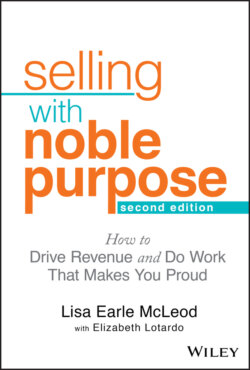Читать книгу Selling With Noble Purpose - McLeod Lisa Earle, Lisa Earle McLeod - Страница 25
The Two Big Human Needs: Belonging and Significance
ОглавлениеOnce you get beyond basic needs like food and shelter, human beings have two core emotional needs: belonging and significance. We want to be connected to other people, and we want to know that what we're doing matters to someone. The need for belonging and significance transcends age, culture, sex, race, and socioeconomic status.
Our deepest desire is to make a difference in the world, and our darkest fear is that we don't.
We don't just want to make a difference in our personal lives or through philanthropic activities. We want to make a difference at work. We spend the better part of our waking hours at work. Those hours ought to mean something. When you know that your job matters to people, you come alive. Your frontal lobes light up, and you have greater access to problem solving, language, and empathy.
Yet for some reason, many teams seem to operate as though some bizarre memo went out years ago saying, “Please don't bring any emotions to work.” This mentality is entirely unhelpful. When was the last time you heard a CEO say, “I wish my people weren't so motivated and excited”? Any good leader knows, achieving peak performance requires emotional buy‐in. The reasons people resist addressing emotion at work is because:
Emotions are messy and hard to understand. When you bring in the good emotions, you're also going to have to deal with negatives. This can feel like Pandora's box; people resist opening it.
People aren't skilled at dealing with other people's emotions. Even the silent, stoic boss is generating an emotional response from his or her team. It may not be acknowledged, but it's there. It feels safer to back away from other people's emotions rather than owning the role you may play in creating them.
We delude ourselves into believing our business decisions are logical. One look inside any merger or acquisition will tell you that emotion plays a role in every business decision. Logic makes you think; emotion makes you act.
Ignoring the emotional element doesn't make it go away; it simply prevents you from leveraging it. When we acknowledge the role emotions play, we can learn to tap into them for good. If you want to create a highly engaged team, you can start by strengthening their emotional connection to their work.
You read in the introduction about a top‐performing biotech salesperson who outsold every other rep in the entire country three years running. She achieved this because every day when she went on calls, she remembered a grandmother she had helped. Thinking about the grandmother did more than just motivate this sales rep to make extra sales calls on a rainy Friday afternoon. It ignited her frontal lobe, which made her a better problem‐solver and strategic planner, more skilled with language, and more empathetic with her customers.
Is it any wonder that she was the number‐one rep three years running? Her peers and competitors were likely conducting sales calls with the basic parts of their brain, going through the motions mechanically without igniting any kind of purpose in themselves or their customers.
But because the top rep was thinking about the person she had helped—the grandmother who, because of her product, could now play with her grandkids—she was leveraging both her intellect and her emotions to their fullest extent.
A Noble Sales Purpose ignites that type of higher‐level thinking with everyone on your team. It serves as an organizing element for your sales force and keeps you focused on the big picture. It's your version of the grandmother.
Sellers who carry a clear picture of the impact they want to have on customers in sales calls are more powerful. They're more creative, they're higher energy, and they're more resilient in the face of setbacks. Your job as a leader is to proactively help them generate that mental picture and keep it alive on a daily basis.
An NSP answers three questions for your team:
What impact do you and your company have on customers?
How are you different from the competition?
On your best day, what do you love about your job?
An NSP is not “We're going to be the number one provider of end‐to‐end solutions.” That's your goal, but it doesn't speak to how you make a difference in clients' lives. An NSP isn't about your desired position in the market. It's about how you impact your clients today.
